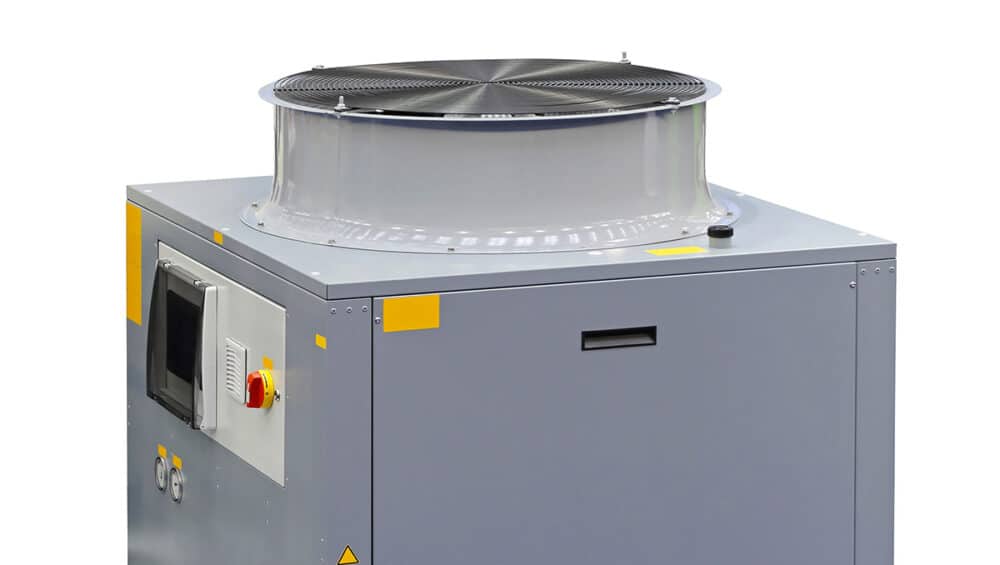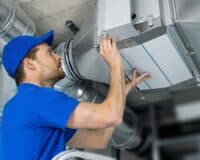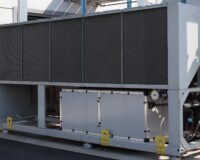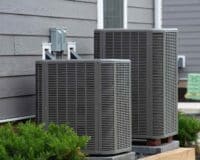If you’re wondering, “What is an air handler?”, look no further! Air handlers are integral components in efficient heating, ventilation and air conditioning (HVAC) systems. While these machines work with heat pumps and ACs to provide maximum comfort and energy savings, each has a different role.
What Does an Air Handler Look Like and Do?
An air handler looks and is built similarly to a furnace, with a casing that houses the evaporator coils, blower motor, and ventilation components such as an air filter for most residential units. Homeowners will generally find their unit located indoors.
Your air handler plays a pivotal role in the functioning of your HVAC system, working in tandem with either an air conditioner or heat pump. This component is usually connected to existing ductwork that functions to circulate comfortable air through every area of your house and back into your air handler.
Your air handler takes the cooled, de-heated air created by your evaporator coils and circulates it through all of your home’s ducts. This is an indispensable part of any HVAC cooling or heating system, as it keeps temperatures regulated throughout the house.
Different Types Of Air Handlers
Not only are there various sizes of air handlers for different properties, but some small units even come equipped with a blower, evaporator coils, and an air filter – often referred to as fan coil units, terminal units or blower coils.
For larger scale applications, a special type of air handler called the Makeup Air Unit (MAU) exists. Unlike traditional systems which recirculate inside air, MAUs are used to only condition outside air. Additionally when these units are placed on roofs they’re referred to as Rooftop Units and primarily serve commercial use cases.
The Difference Between Air Handlers And Air Conditioners
Confused about the distinction between an air conditioner and an air handler? You are not alone, as these terms are sometimes used interchangeably. However, though both units work together to cool your home or office effectively, their individual roles could not be more different. So what is a true definition of an air handler?
Air conditioners cool a space by extracting the heat, while air handlers play an important role in circulating this cool air throughout your home. The source of confusion is that both units have coils: however, for optimal performance and comfort, an air handler must be paired with an accompanying cooling system such as an AC unit.
The Difference Between Air Handlers And Furnaces
Heating your home is easy and efficient with a furnace, which runs on oil, gas or electricity to generate warm air. That same hot air will be then circulated throughout the house by its blower — meaning that you usually won’t need an air handler when using one of these heating systems!
Rather than acting as a companion to furnaces, air handlers are often used with heat pumps. Heat pumps offer an energy-efficient alternative to traditional furnaces by drawing warmth from outside and transferring it into your home – all while the air handler distributes this comfort throughout your residence!
When used correctly, air handlers are an excellent tool to maintain indoor air quality; however, they should not be mistaken as a substitute for a heater.
Reasons to Have an Air Handler
If you utilize traditional heating sources such as gas, electricity, or oil for your home, an air handler is not necessary. However, if you are looking at alternative options like electric heat pumps to control the temperature of your house then investing in an air handler would be a wise decision. It’s worth noting that certain heat pump and air conditioner systems already include an air handler built into them- so make sure to check before making any investments!
Considering the kind of HVAC system you have is important, but it isn’t the only factor in determining whether or not an air handler is needed. The area you live in also plays a role – homes located in colder climates usually use furnaces and thus do not require an air handler.
Regions with a mild climate rarely require furnaces as they normally opt for the more cost-efficient and energy-saving heat pumps. For example, southern areas are far more likely to rely on heat pumps than northern regions.
By pairing your heat pump with an air handler, you can not only reduce the amount of wear and tear on it but also increase its lifespan significantly. Investing in a reliable HVAC system is essential for having continuous comfort at home – so don’t miss out on this smart choice!
Signs You Need to Replace Your Air Handler
Unveiling the answer to “What is an air handler?” necessitates understanding how to troubleshoot problems. Although these devices are highly durable, not even they last forever! If you perceive any of the following signs, it might be time for a replacement:
Weak airflow: If the air blowing out of your vents is weak or varies in strength, then there may be a problem with your blower motor. Ignoring this issue can put extra strain on your air handler and eventually cause it to stop working altogether. Don’t forget that dirt accumulation can also play a role here, so you might only need to give the motor a proper cleaning!
Frozen air conditioner during summer: During the summer months, if you encounter ice on your air handler it could be due to a range of causes. It may just need a simple cleanse – such as changing out a blocked or dirty air filter – and/or washing off dusty evaporator coils. Nevertheless, in some cases this can signify that you have refrigerant leak, making now the perfect time to replace your entire air handling unit!
Skyrocketing energy bills: During the winter or summer, you may experience an increase in your energy bills; however, if they are extraordinarily high, there is likely a problem with your HVAC system. There could be numerous issues such as a broken air handler that can cause massive spikes in your electric bill.
An outdated HVAC system: To ensure the longevity of your heating, ventilation and air conditioning (HVAC) system, it’s recommended by the U.S. Department of Energy that you replace it every 10-15 years – any longer than this and components like air handlers will start to wear down or even crack! Additionally, regular HVAC maintenance checks can help spot issues before they become serious problems.



